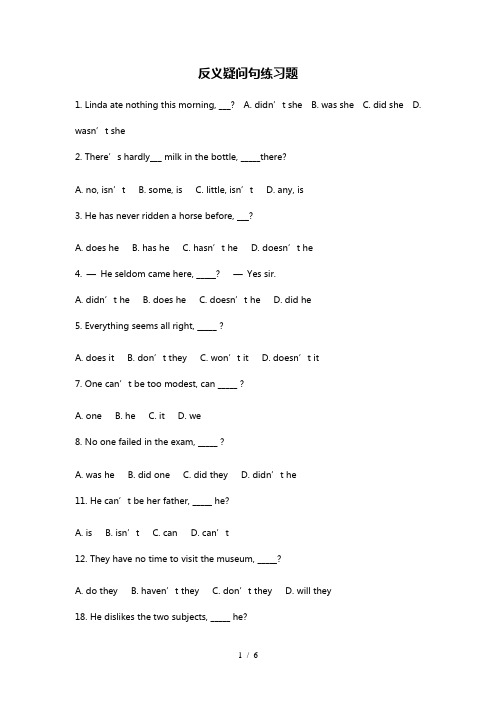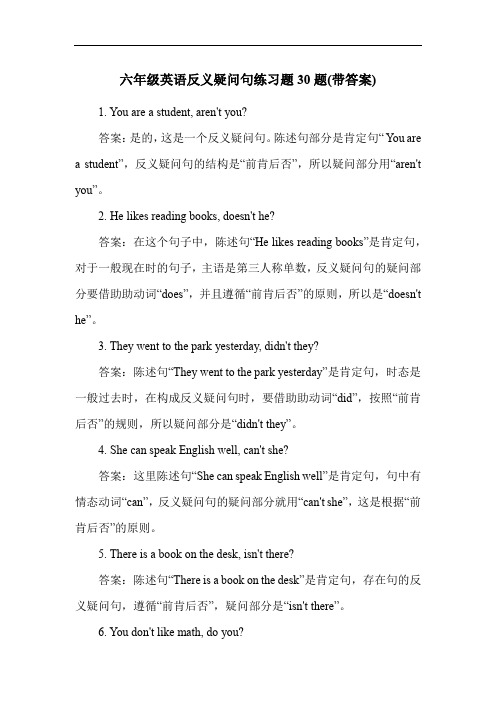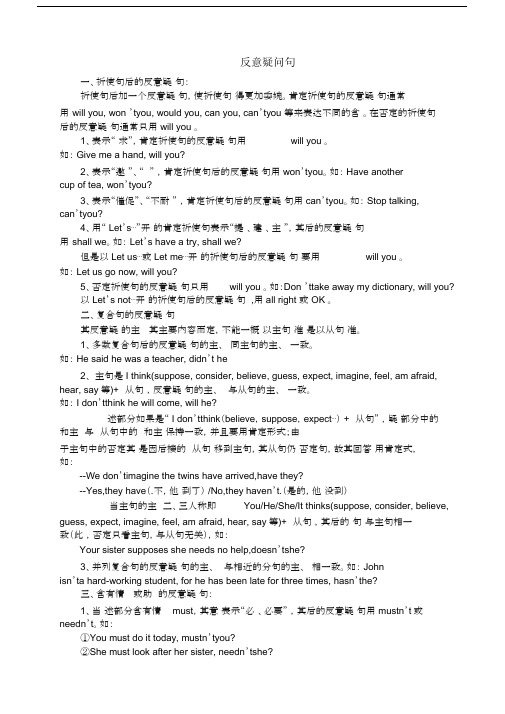反义疑问句练习题(附答案)
六年级英语反意疑问句练习题30题(答案解析)

六年级英语反意疑问句练习题30题(答案解析)1. You are a student, aren't you?A. are youB. aren't youC. do youD. don't you答案解析:B。
反意疑问句遵循前肯后否或前否后肯的原则。
本题前半句是肯定句,所以后半句用否定形式,且前面有be 动词are,后面也用be 动词,所以是aren't you。
A 选项重复了前半句的肯定形式错误。
C 和D 选项用了助动词do 和don't,与前半句的be 动词不一致,错误。
2. She is a teacher, isn't she?A. is sheB. isn't sheC. does sheD. doesn't she答案解析:B。
同样遵循前肯后否或前否后肯原则。
前半句是肯定句且有be 动词is,后半句用否定形式isn't she。
A 选项肯定形式错误。
C 和D 选项用了助动词does 和doesn't,与前半句的be 动词不一致,错误。
3. He likes apples, doesn't he?A. does heB. doesn't heC. is heD. isn't he答案解析:B。
前半句是肯定句且有实义动词likes,后半句用助动词doesn't,主语是he。
A 选项肯定形式错误。
C 和D 选项的be 动词is 和isn't 与前半句不一致,错误。
4. They play football, don't they?A. do theyB. don't theyC. are theyD. aren't they答案解析:B。
前半句有实义动词play,后半句用助动词don't,主语是they。
A 选项肯定形式错误。
C 和D 选项的be 动词are 和aren't 与前半句不一致,错误。
(完整版)反义疑问句经典练习(含标准答案)

反义疑问句练习题1. Linda ate nothing this morning, ___? A. didn’t she B. was she C. did she D. wasn’t she2. There’s hardly___ milk in the bottle, _____there?A. no, isn’tB. some, isC. little, isn’tD. any, is3. He has never ridden a horse before, ___?A. does heB. has heC. hasn’t heD. doesn’t he4. —He seldom came here, _____? —Yes sir.A. didn’t heB. does heC. doesn’t heD. did he5. Everything seems all right, _____ ?A. does itB. don’t theyC. won’t itD. doesn’t it7. One can’t be too modest, can _____ ?A. oneB. heC. itD. we8. No one failed in the exam, _____ ?A. was heB. did oneC. did theyD. didn’t he11. He can’t be her father, _____ he?A. isB. isn’tC. canD. can’t12. They have no time to visit the museum, _____?A. do theyB. haven’t theyC. don’t theyD. will they18. He dislikes the two subjects, _____ he?A. doesB. doesn’tC. isD. isn’t19. These tools are useless now, _____ ?A. are theyB. aren’t theyC. is itD. isn’t it23. Let’s go there by bus, ___?A. will youB. shall weC. don’t youD. will you24. Let us go to play football, ___?A. will youB. shall weC. do weD. are we25. Don’t forget to give Polly some food and change her water, ___?A. will youB. shall weC. won’t youD. do you26. —Let’s go shopping this afternoon, _____? —All right.A. will weB. shall weC. don’t weD. are we27. —Pass me the dictionary, _____? —Yes, with pleasure.A. would youB. will youC. won’t youD. wouldn’t you30. There is little water in the glass, ____?A. isn’t thereB. isn’t itC. is itD. is there32. There won’t be any concert this Saturday evening, _____ ?A. will there notB. will thereC. is thereD. won’t33. —I guess she taught herself Japanese, ______? —Yes.A. don’t IB. did sheC. do ID. didn’t she34. I don’t believe you are right, _____ ?A. are youB. do youC. won’t youD. do35. She doesn’t think that Tom sings best in the class, _____ ?A. does sheB. doesn’t sheC. does heD. doesn’t he37. I know you didn’t want to hurt me, _____ ?A. did youB. didn’t youC. do ID. don’t I38. If my father were here he would be very happy, _____ ?A. weren’t heB. were heC. wouldn’t heD. would he1.It’s very hot today, _______________ ?2. He can speak Chinese, _______________ ?3. Meimei studies in a middle school, _______________ ?4. He never gets up late , _______________ ?5. Don’t go out at night, _______________ ?6.He never loves cold weather , _______________ ?7. You finished the task yesterday, _______________ ?9.T om has been to Singapore , _______________ ?10.The story is little interesting, _______________ ?11.Everything starts to grow in spring, _______________ ?12.He can hardly finish his homework, _______________ ?13.I’m in Class 3,Grade 2, _______________ ?14.Let’s go shopping , _______________ ?15.She doesn’t like climbing hills , _______________ ?16.I don’t think it is cold today, _______________ ?17. You think he is a good flight attendant, _______________ ?18.Nobody knows where she lives, _______________ ?19.Few students can answer the question, _______________ ?20.Mike likes English, _______________ ?21.That was a wonderful night, _______________ ?22.Your sister helped him, _______________ ?23.T om is skating, _______________ ?24.You aren’t a teacher, _______________ ?25.They haven’t been to the Great Wall, _______________ ?26.You will join the soccer team, _______________ ?27.He likes neither apples nor pears, _______________ ?28.There are some good books for you, _______________ ?29.They have been there twice, _______________ ?30.Let’s do it now, _______________ ?31.You dislike this kind of gifts, _______________ ?32.Nothing is impossible, _______________ ?33.Everything is possible, _______________ ?34.He doesn’t go to school by bus, _______________ ?35.There is little milk left in the bottle, _______________ ?36.Let us clean the classroom by ourselves, _______________ ?37.He has studied here for about four years, _______________ ?38.You have never lost money before, _______________ ?39.Few of them hurt themselves in the accident last night, _______________ ?40.Peter could hardly see the words on the blackboard, _______________ ?41.She’s American, _______________ ?42.There will be a volleyball match in our school, _______________ ?43.Don’t smoke in the reading-room, _______________ ?44.I don’t think he is right, _______________ ?45.You must do your homework by yourself, _______________ ?46.You mustn’t touch the machine, _______________ ?47.He must be a worker, _______________ ?48.Someone looked for me yesterday, _______________ ?49.I’m a teacher, _______________ ?50.What a nice watch, _______________ ?51.I wish to use your ruler, _______________ ?52.I have to stay at home, _______________ ?53.You’d better wear warm clothes today, _______________ ?54.What he needs is his parents’love, _______________ ?55.You’d like a cup of tea, _______________ ?56.Don’t be late again, _______________ ?57.Their prices are really low, _______________ ?58.Reading is good for you to learn English, _______________ ?59.No one knows about it, _______________ ?60.I think you should study hard, _______________ ?Key: 1—5 CDBDD 6—10 BACDC 11—15 AABAB 16—20 CCBBA 21—25CDBAA 26—30 BBBAD 31—35 BBDAA 36—38 AAC附加答案:1 . isn’t it 2. can’t he 3.doesn’t she 4.does he 5.will you6. does he7.didn’t you8. isn’t9.hasn’t he 10.is it 11.doesn’t it 12.can he 13 .aren’t I 14.shall we 15.does she 16.is it 17.don’t you 18does it 19. can they 20.doesn’t he 21.wasn’t it 22.didn’t she 23.isn’t he 24.are you 25.have they 26.wont you 27.does he 28.aren’t there 29.haven’t they 30.shall we 31.don’t you 32.is it 33.isn’t it 34.does he 35.is there 36.will you 37.hasn’t he 38.have you 39.did they 40.could he 41.isn’t she 42.won’t there 43.will you 44.is he 45.mustn’t you 46.must you 47.isn’t he 48.didn’t they 49.aren’t I 50.isn’t it51.may I 52.don’t I 53.hadn’t you 54.isn’t it 55.wouldn’t you 56.will you 57.aren’t they 58.isn’t it 59.do they 60.shouldn’t you。
六年级英语反义疑问句练习题30题(带答案)

六年级英语反义疑问句练习题30题(带答案)1. You are a student, aren't you?答案:是的,这是一个反义疑问句。
陈述句部分是肯定句“ You are a student”,反义疑问句的结构是“前肯后否”,所以疑问部分用“aren't you”。
2. He likes reading books, doesn't he?答案:在这个句子中,陈述句“He likes reading books”是肯定句,对于一般现在时的句子,主语是第三人称单数,反义疑问句的疑问部分要借助助动词“does”,并且遵循“前肯后否”的原则,所以是“doesn't he”。
3. They went to the park yesterday, didn't they?答案:陈述句“They went to the park yesterday”是肯定句,时态是一般过去时,在构成反义疑问句时,要借助助动词“did”,按照“前肯后否”的规则,所以疑问部分是“didn't they”。
4. She can speak English well, can't she?答案:这里陈述句“She can speak English well”是肯定句,句中有情态动词“can”,反义疑问句的疑问部分就用“can't she”,这是根据“前肯后否”的原则。
5. There is a book on the desk, isn't there?答案:陈述句“There is a book on the desk”是肯定句,存在句的反义疑问句,遵循“前肯后否”,疑问部分是“isn't there”。
6. You don't like math, do you?答案:陈述句“You don't like math”是否定句,反义疑问句的结构是“前否后肯”,所以疑问部分是“do you”。
(完整word版)反义疑问句练习题(附答案).doc

反意疑问句一、祈使句后的反意疑句:祈使句后加一个反意疑句,使祈使句得更加委婉。
肯定祈使句的反意疑句通常用will you, won ’tyou, would you, can you, can’tyou 等来表达不同的含。
在否定的祈使句后的反意疑句通常只用 will you 。
1、表示“ 求”,肯定祈使句的反意疑句用will you 。
如: Give me a hand, will you?2、表示“邀”、“ ” ,肯定祈使句后的反意疑句用 won’tyou。
如: Have anothercup of tea, won’tyou?3、表示“催促”、“不耐” ,肯定祈使句后的反意疑句用 can’tyou。
如: Stop talking,can’tyou?4、用“ Let’s⋯”开的肯定祈使句表示“提、建、主”,其后的反意疑句用shall we。
如: Let’s have a try, shall we?但是以 Let us⋯或 Let me⋯开的祈使句后的反意疑句要用will you 。
如: Let us go now, will you?5、否定祈使句的反意疑句只用will you 。
如:Don ’ttake away my dictionary, will you?以Let’s not⋯开的祈使句后的反意疑句 ,用 all right 或 OK 。
二、复合句的反意疑句其反意疑的主其主要内容而定,不能一概以主句准是以从句准。
1、多数复合句后的反意疑句的主、同主句的主、一致。
如: He said he was a teacher, didn’t he2、主句是 I think(suppose, consider, believe, guess, expect, imagine, feel, am afraid, hear, say等)+从句,反意疑句的主、与从句的主、一致。
如: I don’tthink he will come, will he?述部分如果是“ I don’tthink(believe,suppose,expect⋯) +从句” ,疑部分中的和主与从句中的和主保持一致,并且要用肯定形式;由于主句中的否定其是因后接的从句移到主句,其从句仍否定句,故其回答用肯定式,如:--We don’timagine the twins have arrived,have they?--Yes,they have(.不,他到了) /No,they haven’t.(是的,他没到)当主句的主二、三人称即You/He/She/It thinks(suppose, consider, believe, guess, expect, imagine, feel, am afraid, hear, say等)+从句,其后的句与主句相一致(此,否定只看主句,与从句无关),如:Your sister supposes she needs no help,doesn’tshe?3、并列复合句的反意疑句的主、与相近的分句的主、相一致。
30题反义疑问句经典练习(含答案)

反义疑问句1. Linda ate nothing this morning, ___?A. didn’t sheB. was sheC. did sheD. wasn’t she2. There’s hardly___ milk in the bottle, _____there?A. no, isn’tB. some, isC. little, isn’tD. any, is3. He has never ridden a horse before, ___?A. does heB. has heC. hasn’t heD. doesn’t he4. — He seldom came here, _____?— Yes sir.A. didn’t heB. does heC. doesn’t heD. did he5. Everything seems all right, _____ ?A. does itB. don’t theyC. won’t itD. doesn’t it6. One can’t be too modest, can _____ ?A. oneB. heC. itD. we7. No one failed in the exam, _____ ?A. was heB. did oneC. did theyD. didn’t he8. Neither you nor I am an artist, _____ ?A. am IB. aren’t weC. are weD. amn’t I9. He can’t be her father, _____ he?A. isB. isn’tC. canD. can’t10. They have no time to visit the museum, _____?A. do theyB. haven’t theyC. don’t theyD. will they11. You’d better go at once, _____ you?A. hadn’tB. didC. didn’tD. don’t12. You’d rather work than play, _____ you?A. hadn’tB. wouldn’tC. didn’tD. mustn’t13. You dare not do that, _____ you?A. don’tB. doC. dareD. daren’t14. He dislikes the two subjects, _____ he?A. doesB. do esn’tC. isD. isn’t15. These tools are useless now, _____ ?A. are theyB. aren’t theyC. is itD. isn’t it16. He used to get up at 6:30, _____ he?A. didn’t heB. did heC. used heD. wouldn’t he17. Let’s go there by bus, ___?A. will youB. shall weC. don’t youD. will you18. Let us go to play football, ___?A. will youB. shall weC. do weD. are we19. Don’t forget to give Polly some food and change her water, ___?A. will youB. shall weC. won’t youD. do you20. — Pass me the dictionary, _____?— Yes, with pleasure.A. would youB. will youC. won’t youD. wouldn’t you21. There is little water in the glass, ____?A. isn’t thereB. isn’t itC. is itD. is there22. — I guess she taught herself Japanese, ______?— Yes.A. don’t IB. did sheC. do ID. didn’t she23. I don’t believe you are right, _____ ?A. are youB. do youC. won’t youD. do I24. I know you didn’t want to hurt me, _____ ?A. did youB. didn’t youC. do ID. don’t I25. If my father were here he would be very happy, _____ ?A. weren’t heB. were heC. wouldn’t heD. would he26. Tina is unhappy now, ____________?27. You must have been to the Great Wall, ____________?28. Learning how to repair motors takes a long time, _____________?29. They must have stayed at home last night,____________?30. You needn’t attend the meeting, ______________________?Key: 1—5 CDBDD 6—10 AC CAA 11—15 ABCBB 16—20A BAAB 21—25DDAAC 26—30 isn’t she haven’t you doesn’t it didn’t they need you。
(完整版)初中英语反义疑问句经典练习(含答案)(改)

反义疑问句练习题1.Lind.at.nothin.thi.morning.___.......A.didn’.sh. B.wa.sh. C.di.sh. D.wasn’.sh.2.There’.hardly__.mil.i.th.bottle._____there..A.no.isn’..B.some.i..C.little.isn’..D.any.i.3.H.ha.neve.ridde..hors.before.___..... A.doe.h..B.ha.h..C.hasn’.h..D.doesn’.h.4..H.seldo.cam.here._____...Ye.sir.. A.didn’.h..B.doe.h..C.doesn’.h..D.di.h.5.Everythin.seem.al.right.____........ A.doe.i..B.don’.the..C.won’.i..D.doesn’.i.7.On.can’.b.to.modest.ca.____....... A.on..B.h..C.i..D.w.8.N.on.faile.i.th.exam.____........ A.wa.h..B.di.on..C.di.the..D.didn’.h.11.H.can’.b.he.father.____.he........A.i..B.isn’..C.ca..D.can’.12.The.hav.n.tim.t.visi.th.museum._____..A.d.the..B.haven’.the..C.don’.the..D.wil.the.18.H.dislike.th.tw.subjects.____.he.....A.doe..B.doesn’..C.i..D.isn’.eles.now.____.......A.ar.the..B.aren’.the..C.i.i..D.isn’.i.23.Let’.g.ther.b.bus.___..........A.wil.yo..B.shal.w..C.don’.yo..D.wil.yo.24.Le.u.g.t.pla.football.___........ A.wil.yo..B.shal.w..C.d.w..D.ar.w.25.Don’.forge.t.giv.Poll.som.foo.an.chang.he.water._.A.wil.yo..B.shal.w..C.won’.yo..D.d.yo.26..Let’.g.shoppin.thi.afternoon._____.. .Al.right.A.wil.w..B.shal.w..C.don’.w..D.ar.w.27..Pas.m.th.dictionary._____...Yes.wit.pleasure.A.woul.yo..B.wil.yo..C.won’.yo..D.wouldn’.yo.30.Ther.i.littl.wate.i.th.glass.____.A.isn’.ther..B.isn’.i..C.i.i..D.i.ther.32.Ther.won’.b.an.concer.thi.Saturda.evening.____..A.wil.ther.no..B.wil.ther..C.i.ther..D.won’.33...gues.sh.taugh.hersel.Japanese.______.. .Yes. A.don’...B.di.sh..C.d...D.didn’.sh.34..don’.believ.yo.ar.right.____...........A.ar.yo..B.d.yo..C.won’.yo..D.d.35.Sh.doesn’.thin.tha.To.sing.bes.i.th.class.____..A.doe.sh..B.doesn’.sh..C.doe.h..D.doesn’.h.37..kno.yo.didn’.wan.t.hur.me.____........A.di.yo..B.didn’.yo..C.d...D.don’..38.I.m.fathe.wer.her.h.woul.b.ver.happy.____..A.weren’.h..B.wer.h..C.wouldn’.h..D.woul.h.1.It’.ver.ho.today, _______________ ........2. H.ca.spea.Chinese, _______________ ?3. Meime.studie.i..middl.school, _______________ .t., _______________ ?5.Don’t go ou.a.night, _______________ .......6.H.neve.love.col.weathe., _______________ ?7.Yo.finishe.th.tas.yesterday, _______________ ...9.To.ha.bee.t.Singapor., _______________ ?10.Th.story i.littl.interesting, _______________ ?11.Everythin.start.t.gro.i.spring, _______________ . 12.H.ca.hardl.finis.hi.homework, _______________ ?13.I’.i.Clas.3,Grad.2, _______________ ........14.Let’.g.shoppin., _______________ ?15.Sh.doesn’.lik.climbin.hill., _______________ .... 16..don’.thin.i.i.col.today, _______________ ?17.Yo.thin.h.i..goo.fligh.attendant,. _______________ .18.Nobod.know.wher.sh.lives, _______________ ?19.Fe.student.ca.answe.th.question, _______________ ..20.Mik.like.English. _______________ ?21.That was a wonderful night, _______________ ? 22.Your sister helped him, _______________ ?23.Tom is skating, _______________ ?24.You aren’t a teacher, _______________ ?25.They haven’t been to the Great Wall, _______________ ? 26.You will join the soccer team, _______________ ?27.He likes neither apples nor pears, _______________ ? 28.There are some good books for you, _______________ ?29.They have been there twice, _______________ ? 30.Let’s do it now, _______________ ?31.You dislike this kind of gifts, _______________ ? 32.Nothing is impossible, _______________ ?33.Everything is possible, _______________ ? 34.He doesn’t go to school by bus, _______________ ?35.There is little milk left in the bottle, _______________ ?36.Let us clean the classroom by ourselves, _______________ ?37.He has studied here for about four years, _______________ ?38.You have never lost money before, _______________ ?39.Few of them hurt themselves in the accident last night, _______________ ?40.Peter could hardly see the words on the blackboard, _______________ ?41.She’s American, _______________ ? 42.There will be a volleyball match in our school, _______________ ? 43.Don’t smoke in the reading-room, _______________ ? 44.I don’t think he is right, _______________ ?45.You must do your homework by yourself, _______________ ?46.You mustn’t touch the machine, _______________ ?47.He must be a worker, _______________ ? 48.Someone looked for me yesterday, _______________ ?49.I’m a teacher, _______________ ? 50.What a nice watch, _______________ ?51.I wish to use your ruler, _______________ ? 52.I have to stay at home, _______________ ?53.You’d better wear warm clothes today, _______________ ?54.What he needs is his parents’ love, _______________ ?55.You’d like a cup of tea, _______________ ? 56.Don’t be late again, _______________ ?57.Their prices are really low, _______________ ? 58.Reading is good for you to learn English, _______________ ? 59.No one knows about it, _______________ ? 60.I think you should study hard, _______________ ?Key: 1—5 CDBDD 6—10 BACDC 11—15 AABAB 16—20 CCBBA 21—25CDBAA 26—30 BBBAD 31—35 BBDAA 36—38 AAC附加答案:..isn’.it.. 2.can’.h.. 3.doesn’.she..4.doe.he... 5.wil.yo.6.does.he.7.didn’.you .8..isn’....9.hasn’.he...10.i.it11.doesn’t it 12.can he 13 .aren’t I 14.shall we 15.does she16.is it 17.don’t you18does it 19. can they 20.doesn’t he21.wasn’t it 22.didn’t she 23.isn’t he 24.are you 25.have they26.wont you 27.does he 28.aren’t there 29.haven’t they 30.shall we31.don’t you 32.is it 33.isn’t it 34.does he 35.is th ere36.will you 37.hasn’t he 38.have you 39.did they 40.could he41.isn’t she 42.won’t there 43.will you 44.is he 45.mustn’t you46.must you 47.isn’t he 48.didn’t they 49.aren’t I 50.isn’t it51.may I 52.don’t I 53.hadn’t you 54.isn’t it 55.wouldn’t you56.will you 57.aren’t they 58.isn’t it 59.do they 60.shouldn’t you。
四年级英语反义疑问句练习题30题(答案解析)

四年级英语反义疑问句练习题30题(答案解析)1. You are a student, aren't you?答案解析:这是一个be动词(are)引导的反义疑问句。
反义疑问句的构成规则是:前半句是肯定陈述句,后半句则用否定的简短问句。
前半句“You are a student”是肯定句,所以后半句用“aren't you”。
2. He is a good boy, isn't he?答案解析:此题为be动词(is)引导的反义疑问句。
根据规则,前句为肯定陈述,后句要用否定疑问形式。
这里前半句“He is a good boy”是肯定的,所以后面是“isn't he”。
3. She was at school yesterday, wasn't she?答案解析:这是be动词((was)引导的反义疑问句。
由于前半句“She was at school yesterday”是肯定句,反义疑问句的后半句就要用否定形式“wasn't she”,这是遵循前肯后否的原则。
4. They like apples, don't they?答案解析:这里是助动词((do)引导的反义疑问句。
因为前半句“They like apples”是一般现在时的肯定陈述句,且句中的动词“like”是实义动词,所以反义疑问句的后半句要用助动词do的否定形式“don't they”。
5. We have a new book, don't we?答案解析:这是助动词((do)引导的反义疑问句。
前半句“We have a new book”是一般现在时的肯定句,其中“have”在这里是实义动词,按照规则,后半句要用助动词do的否定形式“don't we”。
6. Tom can swim, can't he?答案解析:这是情态动词((can)引导的反义疑问句。
四年级英语反义疑问句练习题30题带答案

四年级英语反义疑问句练习题30题带答案1. He is a student, isn't he?答案:是。
解析:在这个反义疑问句中,前面的陈述部分“He is a student”是肯定句,根据反义疑问句的规则,肯定句后面的疑问部分要用否定形式,所以是“isn't he”。
这里be动词是is,疑问部分就将is变为否定形式isn't,然后加上主语he。
2. She is happy, isn't she?答案:是。
解析:陈述部分“She is happy”为肯定句,按照规则,反义疑问句的疑问部分要用否定形式。
be动词是is,否定形式为isn't,再加上主语she。
3. It is a cat, isn't it?答案:是。
解析:前面陈述部分“It is a cat”是肯定句,对于这种以be动词is构成的肯定句,反义疑问句的疑问部分为否定形式,即把is变为isn't,再加上主语it。
4. You are a good boy, aren't you?答案:是。
解析:陈述部分“You are a good boy”是肯定句,由于be动词是are,所以反义疑问句的疑问部分为否定形式aren't,再加上主语you。
5. They are at home, aren't they?答案:是。
解析:陈述部分“They are at home”是肯定句,be动词为are,根据反义疑问句的规则,疑问部分为否定形式aren't,再加上主语they。
6. He is my father, isn't he?答案:是。
解析:陈述部分“He is my father”为肯定句,be动词是is,反义疑问句的疑问部分为否定形式isn't,再加上主语he。
7. She is in the classroom, isn't she?答案:是。
- 1、下载文档前请自行甄别文档内容的完整性,平台不提供额外的编辑、内容补充、找答案等附加服务。
- 2、"仅部分预览"的文档,不可在线预览部分如存在完整性等问题,可反馈申请退款(可完整预览的文档不适用该条件!)。
- 3、如文档侵犯您的权益,请联系客服反馈,我们会尽快为您处理(人工客服工作时间:9:00-18:30)。
反意疑问句一、祈使句后的反意疑问句:祈使句后加一个反意疑问句,使祈使句变得更加委婉。
肯定祈使句的反意疑问句通常用will you, won’t you, would you, can you, can’t you等来表达不同的含义。
在否定的祈使句后的反意疑问句通常只用will you。
1、表示“请求”,肯定祈使句的反意疑问句用will you。
如:Give me a hand, will you?2、表示“邀请”、“劝诱”时,肯定祈使句后的反意疑问句用won’t you。
如:Have another cup of tea, won’t you?3、表示“催促”、“不耐烦”时,肯定祈使句后的反意疑问句用can’t you。
如:Stop talking, can’t you?4、用“Let’s…”开头的肯定祈使句表示“提议、建议、主张”,其后的反意疑问句用shall we。
如:Let’s have a try, shall we?但是以Let us…或Let me…开头的祈使句后的反意疑问句则要用will you。
如:Let us go now, will you?5、否定祈使句的反意疑问句只用will you。
如:Don’t take away my dictionary, will you?以Let’s not…开头的祈使句后的反意疑问句,用all right或OK。
二、复合句的反意疑问句其反意疑问的主谓语视其主要内容而定,不能一概说以主句为准还是以从句为准。
1、多数复合句后的反意疑问句的主、谓语同主句的主、谓语一致。
如:He said he was a teacher, didn’t he2、①主句是I think(suppose, consider, believe, guess, expect, imagine, feel, am afraid, hear, say 等)+宾语从句时,反意疑问句的主、谓语应与从句的主、谓语一致。
如:I don’t think he will come, will he?②陈述部分如果是“I don’t think(believe,suppose,expect…)+宾语从句”时,疑问部分中的动词和主语应与宾语从句中的动词和主语保持一致,并且要用肯定形式;由于主句中的否定其实是因后接的宾语从句转移到主句,其从句仍为否定句,故其回答应用肯定式,如:--We don’t imagine the twins have arrived,have they?--Yes,they have.(不,他们到了)/No,they haven’t.(是的,他们没到)③当主句的主语为二、三人称即You/He/She/It thinks(suppose, consider, believe, guess, expect, imagine, feel, am afraid, hear, say等)+宾语从句时,其后的问句应与主句相一致(此时,否定只看主句,与从句无关),如:Your sister supposes she needs no help,doesn’t she?3、并列复合句的反意疑问句的主、谓语应与相近的分句的主、谓语相一致。
如:John isn’t a hard-working student, for he has been late for three times, hasn’t he?三、含有情态动词或助动词的反意疑问句:1、当陈述部分含有情态动词must,其意义表示“必须、必要”时,其后的反意疑问句用mustn’t 或needn’t。
如:①You must do it today, mustn’t you?②She must look after her sister, needn’t she?如果must的含义表示“一定是、想必”等推测意义时,其后的反意疑问句则要依据句中的谓语动词的时态结构采用be/have/did/do+not等相应形式。
如:①He must bee ill, isn’t he?②You must have seen the film before, haven’t you?2、如果陈述部分用了must have+P.P.(过去分词),但明示或暗示了过去的时间,其反意疑问句用过去时。
如:He must have seen him yesterday, didn’t he?3、陈述部分含情态动词ought to,其后反意疑问句用oughtn’t或shouldn’t.如:I ought to come here, oughtn’t I?4、陈述部分含情态动词used to其后反意疑问句用usedn’t或didn’t均可。
如:Tom used to live here, usedn’t he?5、陈述部分含有have/has/had to时,其后的反意疑问句用do的相应形式。
如:You have to go, don’t you?但是在陈述句中用have/has/had got to来代替have/has/had to时,反意疑问句用have的相应形式。
如:Ann has got to see a doctor, hasn’t she?6、陈述部分有had better/would rather时,其后的反意疑问句用hadn’t/wouldn’t。
如:①You’d better not stay here, had you?②They would rather take this one, wouldn’t they?7、当陈述部分有dare或need时,若dare和need为实义动词疑问部分的谓语用do的适当形式;若dare和need为情态动词,疑问部分用dare和need构成。
Need与Dare 用法区别一、need的用法1)need可用作实义动词,意为"需要;必要",后面可接名词、动名词或动词不定式等作宾语。
注意"need doing"表示被动意义,相当于need to be done。
例如:I need a dictionary, so I need to go to the bookstore. 我需要一本词典,因此我要去趟书店。
How often does your hair need washing(need to be washed)? 你的头发需要多久洗一次?2)need可用作情态动词,通常用于疑问句和否定句中,后接动词原形。
这时need没有人称和数的变化,也没有时态的变化。
例如:It's only eight o'clock. Need you go so early? 才八点。
你需要去这么早吗?You needn't tell him about it as I have told him. 你不必跟他说那件事,我已经告诉他了。
3)needn't do与needn't have done的区别:两者都表示"不必做......"。
但前者表示现在或将来不必做;而后者表示"过去(本来)不必做(而事实上已经做了)"。
例如:You needn't carry the desks out of the classroom when you clean the classroom. 你打扫教室时不必把桌子搬到教室外。
You needn't have bought such a big TV as it takes too much room. 你本来不必买这么大的电视,它占据的空间太大了(而事实上已经买了)。
二、dare的用法1)dare用作实义动词,此时其后的动词不定式可带to也可不带to,且dare有人称和数以及时态的变化。
例如:I dare to jump down from the top of the wall. 我敢从那墙头上跳下来。
She doesn't dare (to) meet her teacher's eyes. 她不敢与老师对视。
2)dare用作情态动词,后跟动词原形,主要用于疑问句、否定句和条件句中。
例如:How dare she do things like that to me? 她怎么敢对我做那种事?-Dare you catch the mouse? 你敢去抓那只老鼠吗?-I daren't do that. 我不敢抓。
If you dare say that to our teacher, I would vote for you. 如果你敢向我们的老师说那件事,我就投你一票。
四、陈述句主语是某些不定代词的反意疑问句:1、陈述句部分主语是everything, something, anything, nothing时,其后的反意疑问句主语用it。
如:①Everything seems all right, doesn’t it?②Nothing is in the box, is it?2、陈述部分的主语是everybody, somebody, anybody, nobody, everyone, no one, none, either, some one时,其后的反意疑问句用主语they以兼顾所指代的男、女两性。
如:Everybody has got the new books, haven’t they?3、陈述部分主语是不定代词one时,其后的反意疑问句一般用主语one。
如:One can’t be always careful, can one?五、含有否定词或半否定词的反意疑问句:1、陈述部分含有no, never, seldom, hardly, rarely, scarely, few, little等否定或半否定意义的词时,都视为否定,故反意疑问句部分用肯定形式。
如:Few people knew the answer, did they?2、如果陈述部分的否定意义只是由单词加否定前缀构成时,其后的反意疑问句一般要用否定形式。
如:He is unhappy, isn’t he?六、陈述部分的主语是指示代词的反意疑问句:1、陈述部分主语是指示代词this, that时,其后的反意疑问句用主语it。
如:This is important, isn’t it?2、陈述部分主语是指示代词these, those时,其后的反意疑问句用主语they。
如:Those are mine, aren’t they?七、反意疑问句的其他特殊形式:1、陈述部分是“I’m…”结构时,其后的反意疑问句用aren’t I?如:I am a student, aren’t I ?2、陈述部分是there be或there live, there stand, there used to be等结构时,其后的反意疑问句用主语there。
